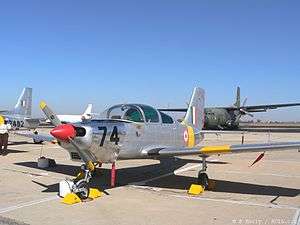HAL HPT-32 Deepak
| HPT-32 | |
|---|---|
 | |
| Role | Primary trainer |
| Manufacturer | Hindustan Aeronautics Limited |
| First flight | 6 January 1977[1] |
| Primary user | Indian Air Force |
The HAL HPT-32 Deepak ("lamp" in Sanskrit) is an Indian prop-driven primary trainer manufactured by Hindustan Aeronautics Limited. The student and the instructor sit side-by-side. The aircraft can accommodate one passenger.
Operational history
The Deepak is used for primary training, observation, liaison and target towing.
When it flies upside-down fuel flows from a collector tank in the fuselage and the inverted flight is limited to 1 min. Deepak has a theoretical glide ratio of 8.5:1. The IAF and HAL are looking into new safety systems such as Ballistic Recovery Systems to enable it to descend safely in the event of an engine failure. On 16 May 2010 the IAF cleared the installation of a parachute recovery system.[2] The HPT-32 aircraft has been replaced by the Pilatus PC-7 Mk II in the IAF, as its workhorse as a Basic Trainer Aircraft (BTA) in 2013.
Accidents
An aircraft crashed in the outskirts of the city of Medak, Andhra Pradesh on 31 July 2009, killing both the pilots. The causes of the crash are being investigated.
In 17 Deepak crashes so far, 19 pilots have died.[3] The Comptroller and Auditor General (CAG) of India has been reported as saying the aircraft is "technologically outdated and beset by flight safety hazards" when discussing the grounding of the fleet in 2009[4]
Versions
- HPT-32
- Basic version.
- HTT-34
- Turboprop version.
Operators
- Indian Air Force
- Indian Navy[1] 8 for basic training
Specifications (HPT-32)
Data from Jane's Aircraft Recognition Guide [5]
General characteristics
- Crew: 2: student, instructor
- Length: 25 ft 4 in (7.7 m)
- Wingspan: 31 ft 2 in (9.5 m)
- Height: 9 ft 7 in (2.9 m)
- Wing area: 15.0 m² (162 ft² [6])
- Empty weight: 2,280 lb (1,034 kg)
- Max takeoff weight: 2,915 lb (1,322 kg)
- Powerplant: 1× Lycoming AEO-540-D4B5 piston engine, 260 hp (194 kW)
Performance
- Maximum speed: 175 mph (281 km/h)
- Range: 755 nm (1,400 km)
Armament
four hardpoints; 255 kg warload; machine gun pods; bombs; rockets
References
| Wikimedia Commons has media related to HAL military aircraft. |
Notes
- 1 2 Taylor 1996, p. 401
- ↑ "IAF gives nod for HPT-32 revival". The Hindu. May 16, 2010. Retrieved May 17, 2010.
- ↑ http://www.business-standard.com/india/news/scrabbling-for-solutions/390823/
- ↑ http://www.thaindian.com/newsportal/uncategorized/crashes-engine-failures-ground-iaf-trainer-aircraft_100240304.html
- ↑ Rendall, David (1995). Jane's Aircraft Recognition Guide. Glasgow, UK: HarperCollinsPublishers. p. 505. ISBN 0-00-4709802.
- ↑ Taylor 1999, p.433
Bibliography